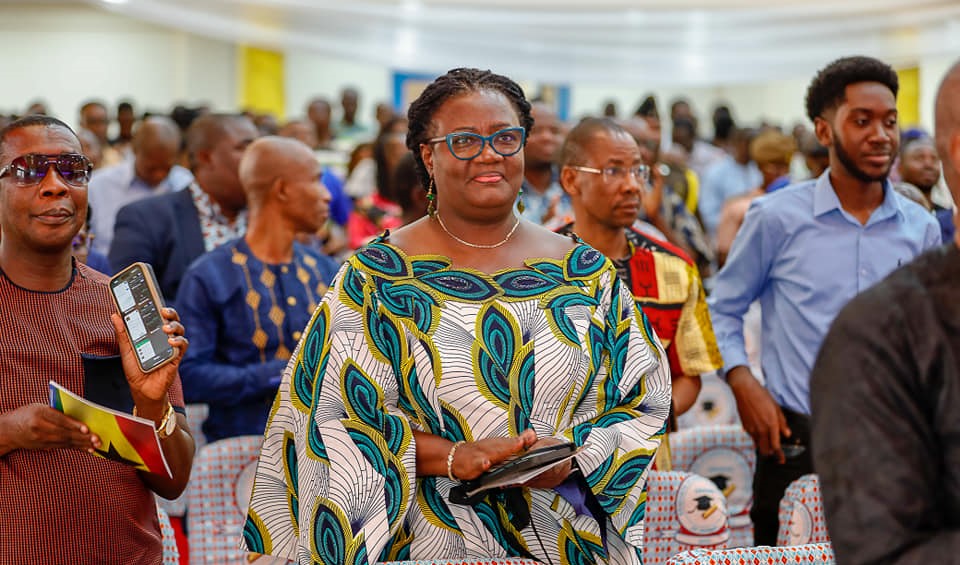By Isaac Arkoh
Cape Coast, Oct. 21, GNA – The University of Cape Coast (UCC) has conferred an honorary doctorate on Prof. Emmanuel Kwaku Akyeampong, a Professor of African and African American history at Harvard University.
The honour was in recognition of his inspirational academic and socio-cultural contributions, as well as professional career development.
It was also in fulfilment of the University’s affirmation to honour industrious local and international icons to encourage others to emulate.
This year’s conferment marked the 13th edition of the Kwame Nkrumah Memorial Lecture series instituted in 1974 but inaugurated in November 1976 by UCC’s first Vice Chancellor, Dr Archie Casley Hayford.
Held annually in honour of Osagyefo Dr Kwame Nkrumah, Ghana’s first President, the 2023 programme, saw a two-day lecture series aimed at reliving the noble life of the late leader.
Similarly, UCC has over the years recognised about 51 other personalities, including Mr Eleazar Chukwuemeka Anyaoku, a former Secretary-General of Commonwealth, Mr Benjamin William Mkapa, the former President of Tanzania, and Prof. Kwesi Botchwey, a former Minister of Finance.
Other beneficiaries included Mr Kwaku Baprui Asante, a former Secretary to Dr Nkrumah, Prof. Patrick Loch Otieno Lumumba, a lawyer and Prof. Akilagpa Sawyerr, a former Vice-Chancellor of the University of Ghana.
Prof. Akyeampong earned his Bachelor of Arts Degree from the University of Ghana, Legon, an M. A. in History from Wake Forest University, and his Ph.D. in History from the University of Virginia, USA.
He is also a graduate of the Andover Newton Theological Seminary and serves as an affiliate minister of the Gospel for the Outreach at Acton Congregational Church.
He is married to Mrs Ntuli Qoboza-Akyeampong and they have three children.
Prof. Akyeampong has been awarded several research fellowships, and made publications including ‘Themes in West Africa’s History, Independent Africa: The First Generation of Nation Builders, Between the Sea and the Lagoon: an Eco-Social History of the Anlo of Southeastern Ghana, 1850 to Recent Times; Drink, Power and Cultural Change: a social history of alcohol in Ghana, 1800 to Present Times.’

Prof. Acheampong expressed appreciation to the UCC for recognising his efforts and promised to work hard to ensure social development.
He recounted his assistance to graduates from UCC at Harvard University and his many research collaborations that were helping to reshape society.
Earlier in a lecture, Prof. Akyeampong, had taken a bold stroll through the life of Dr Nkrumah on the topic: “The Pan-Africanist Nkrumah and Africa’s triple heritage: Christianity, Islam, and Africa’s indigenous religion.”
In a hilarious but thought-provoking recount of Dr Nkrumah’s ordeal, Prof. Akyeampong recalled how he wandered about on the streets of the US but remained true to his spiritual journey.
He said in 1930, Dr Nkrumah endured homelessness in the US, shining shoes, washing pots in restaurants and even selling fish at street corners.
“Though Dr Nkrumah gave up on priesthood and aesthetic lifestyle, spiritual discipline remained attractive to him,” he said.
Dr Nkrumah was completely unpredictable, except for his stand against colonialism, imperialism and racial exploitation of man, Prof. Acheampong said.
Notwithstanding, Dr Nkrumah was shy when he was in a relationship, saying: “Nkrumah was reluctant or too shy to talk to white girls, dance with them or even get too close to them,” he said.
Prof. Johnson Nyarko Boampong, the Vice-Chancellor, reiterated the University’s vision to produce graduates with entrepreneurial mind sets to reduce the phenomenon of graduate unemployment.
He said his administration would seek to ensure that UCC created a niche by providing quality, equitable, and inclusive education that empowered the graduates to be independent, lifelong learners and responsible citizens, with passion for job creation while contributing to public service.
He pledged to reposition UCC as the global hub of creative thinkers offering demand-driven programmes integrated with practical entrepreneurial courses and actively translating the products of its innovative research for sustainable development.
GNA